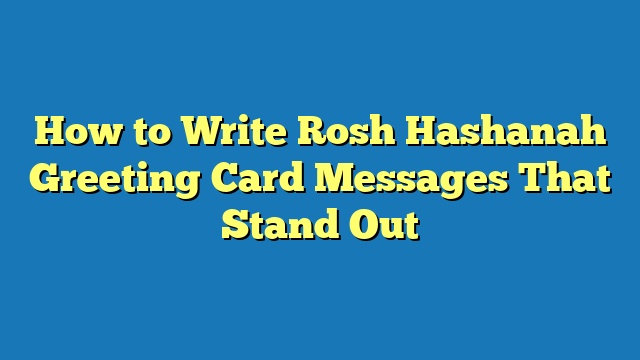Rosh Hashanah greeting card messages are words or phrases used in cards to express well wishes for the Jewish New Year. These messages often convey blessings for a sweet new year, good health, and prosperity.
Sharing Rosh Hashanah greeting cards is a common tradition among Jewish communities worldwide. They are a way to connect with loved ones and celebrate the holiday.
Rosh Hashanah greeting card messages have evolved over time, but they continue to be an important part of the holiday tradition. In recent years, there has been a growing trend towards more personalized and creative messages.
Rosh Hashanah Greeting Card Messages
Rosh Hashanah greeting card messages are an essential part of the Jewish New Year celebration. They convey blessings for a sweet new year, good health, and prosperity. These messages can be found in a variety of formats, from traditional to modern.
- Meaningful: Rosh Hashanah greeting card messages should be meaningful and heartfelt.
- Personal: They should be personalized to the recipient.
- Hopeful: They should express hope for a good year ahead.
- Festive: They should be festive and celebratory.
- Warm: They should convey warmth and goodwill.
- Sincere: They should be sincere and heartfelt.
- Thoughtful: They should be thoughtful and well-written.
- Uplifting: They should be uplifting and inspiring.
- Joyful: They should be joyful and happy.
- Prayerful: They should be prayerful and reflective.
When writing Rosh Hashanah greeting card messages, it is important to consider the recipient’s age, relationship to you, and personal interests. You may also want to include a personal anecdote or memory. The most important thing is to express your sincere wishes for a happy and healthy New Year.
Meaningful
Meaningful Rosh Hashanah greeting card messages convey sincere wishes for a happy and healthy New Year. They express the sender’s love and care for the recipient. Meaningful messages often include personal anecdotes or memories, and they reflect the sender’s knowledge of the recipient’s interests and values.
- Personalization: Meaningful messages are personalized to the recipient. They may include the recipient’s name, a reference to a shared experience, or a wish for something specific that the recipient is hoping for in the New Year.
- Sincerity: Meaningful messages are sincere and heartfelt. They come from the sender’s heart, and they express the sender’s genuine wishes for the recipient’s happiness and well-being.
- Hope: Meaningful messages express hope for a good year ahead. They convey the sender’s belief that the recipient will have a happy and healthy New Year.
- Reflection: Meaningful messages often include a reflective element. They may encourage the recipient to look back on the past year and to think about their hopes and dreams for the future.
Meaningful Rosh Hashanah greeting card messages are a way to show your loved ones how much you care. They are a way to express your hopes and dreams for them in the New Year.
Personal
Personalized Rosh Hashanah greeting card messages are more meaningful and memorable than generic messages. They show the recipient that you have taken the time to think about them and their individual interests and values. This can make them feel special and appreciated.
There are many ways to personalize Rosh Hashanah greeting card messages. You can include the recipient’s name, a reference to a shared experience, or a wish for something specific that the recipient is hoping for in the New Year. For example, you could write:
- “Wishing you a sweet and healthy New Year, [recipient’s name].”
- “I hope you have a wonderful Rosh Hashanah filled with joy, peace, and prosperity.”
- “May this New Year bring you all the things you are hoping for, [recipient’s name].”
You can also personalize Rosh Hashanah greeting card messages by including a personal anecdote or memory. This can help to make the message more meaningful and heartfelt. For example, you could write:
- “I remember the first Rosh Hashanah we spent together. We went to synagogue and then had a delicious dinner at your parents’ house. I’m so grateful for your friendship.”
- “I hope you have a wonderful Rosh Hashanah. I’m thinking of you and sending you all my best wishes.”
Taking the time to personalize Rosh Hashanah greeting card messages is a great way to show your loved ones how much you care. It’s a simple gesture that can make a big difference.
Hopeful
Rosh Hashanah greeting card messages are often hopeful and express wishes for a good year ahead. This is because Rosh Hashanah is a time of new beginnings and reflection. It is a time to look back on the past year and to think about the hopes and dreams for the future. Rosh Hashanah greeting card messages can help to set a positive tone for the New Year and to inspire hope and optimism.
There are many different ways to express hope in Rosh Hashanah greeting card messages. Some common examples include:
- “Wishing you a sweet and healthy New Year.”
- “May this New Year bring you all the things you are hoping for.”
- “I hope you have a wonderful Rosh Hashanah filled with joy, peace, and prosperity.”
When writing Rosh Hashanah greeting card messages, it is important to be sincere and heartfelt. Your words should come from the heart and should reflect your genuine wishes for the recipient’s happiness and well-being.
Hopeful Rosh Hashanah greeting card messages can make a real difference in the lives of the recipients. They can help to lift spirits, inspire hope, and create a positive and optimistic outlook for the New Year.
Festive
Rosh Hashanah greeting card messages should be festive and celebratory because Rosh Hashanah is a time of joy and celebration. It is a time to come together with family and friends to celebrate the New Year. Festive messages can help to create a happy and joyous atmosphere.
There are many different ways to make Rosh Hashanah greeting card messages festive and celebratory. Some common examples include:
- Using bright and cheerful colors
- Including festive images, such as shofars, apples, and honey
- Using upbeat and celebratory language
Here are some real-life examples of festive Rosh Hashanah greeting card messages:
- “Wishing you a sweet and happy New Year filled with joy, peace, and prosperity.”
- “May this New Year be filled with all the things that make you happy.”
- “Wishing you a year of good health, happiness, and success.”
Festive Rosh Hashanah greeting card messages can help to make the holiday even more special. They can help to create a happy and joyous atmosphere and to express your best wishes for the New Year.
Warm
Warm Rosh Hashanah greeting card messages convey a sense of love, care, and support. They make the recipient feel appreciated and loved. Warm messages can also help to create a sense of community and belonging.
- Personalization: Warm messages are often personalized to the recipient. They may include the recipient’s name, a reference to a shared experience, or a wish for something specific that the recipient is hoping for in the New Year.
- Sincerity: Warm messages are sincere and heartfelt. They come from the sender’s heart and express the sender’s genuine wishes for the recipient’s happiness and well-being.
- Gratitude: Warm messages often express gratitude for the recipient’s presence in the sender’s life. They may also express appreciation for the recipient’s love, support, or friendship.
- Hope: Warm messages often express hope for a good year ahead. They convey the sender’s belief that the recipient will have a happy and healthy New Year.
Warm Rosh Hashanah greeting card messages can make a real difference in the lives of the recipients. They can help to lift spirits, inspire hope, and create a sense of love and community.
Sincere
Sincere Rosh Hashanah greeting card messages come from the heart and express the sender’s genuine wishes for the recipient’s happiness and well-being. They are not simply formulaic or obligatory, but rather convey a deep sense of care and affection.
- Personalization: Sincere messages are often personalized to the recipient, reflecting the sender’s knowledge of the recipient’s interests, values, and hopes for the New Year.
- Specificity: Sincere messages are often specific, expressing a clear and heartfelt wish for the recipient’s happiness and well-being.
- Gratitude: Sincere messages often express gratitude for the recipient’s presence in the sender’s life, as well as for the recipient’s love, support, or friendship.
- Reflection: Sincere messages may also include a reflective element, encouraging the recipient to look back on the past year and to think about their hopes and dreams for the future.
Sincere Rosh Hashanah greeting card messages can make a real difference in the lives of the recipients. They can help to lift spirits, inspire hope, and create a sense of love and community.
Thoughtful
Thoughtful Rosh Hashanah greeting card messages are carefully crafted and considerate. They show that the sender has put time and effort into creating a message that is meaningful and heartfelt. Thoughtful messages often include personal anecdotes, references to shared experiences, or well-chosen quotes.
There are many benefits to sending thoughtful Rosh Hashanah greeting card messages. First, they are more likely to be appreciated and remembered by the recipient. A well-written message can make the recipient feel special and loved. Second, thoughtful messages can help to strengthen relationships. They show the recipient that you care about them and that you are thinking of them during this special time of year. Third, thoughtful messages can help to create a sense of community. They remind us that we are all connected and that we are part of a larger whole.
Here are some tips for writing thoughtful Rosh Hashanah greeting card messages:
- Take the time to think about what you want to say.
- Be personal and sincere.
- Use specific examples to show how much you care.
- Proofread your message before sending it.
By following these tips, you can write Rosh Hashanah greeting card messages that are thoughtful, well-written, and meaningful.
Uplifting
Uplifting Rosh Hashanah greeting card messages can help to lift the spirits of the recipient and inspire them to have a positive and hopeful outlook for the New Year. They can remind the recipient of their strengths and abilities, and encourage them to pursue their dreams.
- Encouraging words: Uplifting messages often include encouraging words that can help to motivate and inspire the recipient. For example, you could write, “I believe in you” or “You can achieve anything you set your mind to.”
- Positive affirmations: Uplifting messages can also include positive affirmations that can help to boost the recipient’s self-esteem and confidence. For example, you could write, “You are strong” or “You are capable.”
- Inspirational quotes: Uplifting messages can also include inspirational quotes from famous people or religious leaders. For example, you could write, “The future belongs to those who believe in the beauty of their dreams” (Eleanor Roosevelt).
- Personal anecdotes: Uplifting messages can also include personal anecdotes that can help to inspire the recipient. For example, you could write about a time when you overcame a challenge or achieved a goal.
Uplifting Rosh Hashanah greeting card messages can make a real difference in the lives of the recipients. They can help to lift spirits, inspire hope, and encourage the recipient to pursue their dreams.
Joyful
Rosh Hashanah greeting card messages should be joyful and happy because Rosh Hashanah is a time of celebration and new beginnings. The holiday marks the beginning of the Jewish High Holy Days, a period of introspection and renewal. Rosh Hashanah greeting card messages are a way to spread joy and happiness during this special time of year.
There are many different ways to make Rosh Hashanah greeting card messages joyful and happy. Some common examples include:
- Using bright and cheerful colors
- Including festive images, such as shofars, apples, and honey
- Using upbeat and celebratory language
- Including personal anecdotes or memories that evoke feelings of joy and happiness
Joyful and happy Rosh Hashanah greeting card messages can make a real difference in the lives of the recipients. They can help to lift spirits, inspire hope, and create a sense of joy and celebration during this special time of year.
Prayerful
Prayerful Rosh Hashanah greeting card messages are a way to connect with the spiritual side of the holiday. They can help the recipient to reflect on the past year and to pray for a good year ahead.
- Gratitude: Prayerful messages often express gratitude for the blessings of the past year. They may also express gratitude for the opportunity to start a new year.
- Repentance: Prayerful messages may also include prayers for repentance. They may ask for forgiveness for sins committed in the past year.
- Hope: Prayerful messages often express hope for a good year ahead. They may pray for peace, health, and prosperity.
- Renewal: Prayerful messages may also pray for renewal. They may ask for strength and guidance to make positive changes in the coming year.
Prayerful Rosh Hashanah greeting card messages can help the recipient to connect with the spiritual side of the holiday. They can help the recipient to reflect on the past year and to pray for a good year ahead.
FAQs on Rosh Hashanah Greeting Card Messages
This FAQ section addresses common questions about Rosh Hashanah greeting card messages, providing insights and clarifying their significance. These questions anticipate queries readers may have and offer clear and informative answers.
Question 1: What are Rosh Hashanah greeting card messages?
Rosh Hashanah greeting card messages are words or phrases used in cards to express well wishes for the Jewish New Year. They convey blessings for a sweet new year, good health, and prosperity.
Question 2: Why are Rosh Hashanah greeting card messages important?
Rosh Hashanah greeting card messages are important because they allow individuals to connect with loved ones and celebrate the holiday. They symbolize the sharing of blessings and hopes for the coming year.
Question 3: What are some common elements found in Rosh Hashanah greeting card messages?
Common elements in Rosh Hashanah greeting card messages include blessings for a sweet new year, wishes for good health and prosperity, and expressions of hope for a meaningful year ahead.
Question 4: What are some tips for writing meaningful Rosh Hashanah greeting card messages?
To write meaningful Rosh Hashanah greeting card messages, consider personalizing them to the recipient, expressing sincere well wishes, and incorporating thoughtful anecdotes or memories.
Question 5: How can I make my Rosh Hashanah greeting card messages more unique?
To make Rosh Hashanah greeting card messages more unique, try using creative language, including personal anecdotes or experiences, and adding a touch of humor or inspiration.
Question 6: What is the significance of Rosh Hashanah greeting card messages in Jewish tradition?
Rosh Hashanah greeting card messages hold significance in Jewish tradition as they represent the sharing of blessings, hopes, and prayers for the new year. They symbolize the importance of connection and community during this sacred time.
These FAQs provide a concise overview of Rosh Hashanah greeting card messages, addressing their significance, common elements, and tips for writing meaningful and unique messages. As we delve deeper into this topic, we will explore the cultural and emotional aspects of these messages and their role in fostering connections during the Jewish New Year.
Tips for Writing Rosh Hashanah Greeting Card Messages
Crafting thoughtful and meaningful Rosh Hashanah greeting card messages is an important part of celebrating the Jewish New Year. Here are five tips to help you create messages that will be cherished by your loved ones:
Tip 1: Personalize your message: Tailor your message to the recipient by including their name and referencing shared experiences or qualities you admire.
Tip 2: Express sincere well wishes: Convey genuine feelings of joy and well-being for the recipient’s happiness, health, and prosperity in the coming year.
Tip 3: Use meaningful language: Choose words that resonate with the spirit of Rosh Hashanah, such as “sweet new year,” “good health,” and “abundance.”
Tip 4: Add a touch of humor: A sprinkle of humor can lighten the tone and make your message more memorable, but ensure it’s appropriate and respectful.
Tip 5: Incorporate a personal anecdote or memory: Share a cherished memory or anecdote that reflects your bond with the recipient, adding a personal touch to your message.
By following these tips, you can create Rosh Hashanah greeting card messages that are heartfelt, meaningful, and sure to bring joy to your loved ones. These messages serve as a symbol of connection and well wishes, strengthening the bonds of community during this special time of year.
As we conclude this section on tips, we transition to the final part of the article, which will explore the cultural and emotional significance of Rosh Hashanah greeting card messages, emphasizing their role in fostering connections and celebrating the Jewish New Year.
Conclusion
Rosh Hashanah greeting card messages hold immense cultural and emotional significance, serving as a cherished tradition during the Jewish New Year. They embody the spirit of connection, well wishes, and prayers for a meaningful year ahead. Through personalized messages, sincere expressions, and thoughtful anecdotes, these greetings strengthen the bonds of community and reflect the importance of shared experiences.
Key points highlighted in this article include the significance of Rosh Hashanah greeting card messages in Jewish tradition, their role in fostering connections, and tips for crafting heartfelt and meaningful messages. These messages are not merely words on paper but a representation of the deep bonds and well wishes shared among loved ones during this special time of year.









Tips for Using "Template by Kevin Crafts" Comments for Meaningful Online Discussions